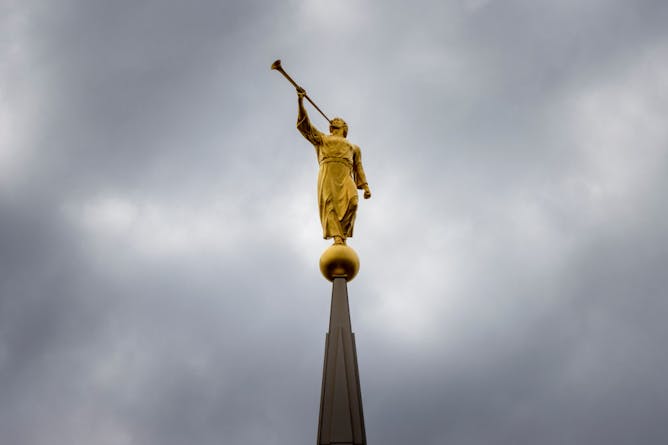|
Top headlines
Lead story
Politics isn’t always welcome in church pews. Even so, American culture and media frequently treat Christianity and conservative politics as though they go hand in hand – especially evangelical churches. Members of the Church of Jesus Christ of Latter-day Saints, often referred to as the Mormon church, also tend to lean toward the GOP.
So it might be surprising to hear LDS leaders discouraging straight-ticket voting. But that’s precisely what they did last month in a letter read during worship services. “Merely voting a straight ticket or voting based on ‘tradition’ without careful study of candidates and their positions on important issues is a threat to democracy and inconsistent with revealed standards,” the church’s top three authorities wrote.
Why now? Political scientist David Campbell, author of several books on religion and politics, looks to the rapid decline of religious membership in the U.S. For some Americans, the association between religion and the Republican Party has kept them away from church. Would more two-partyism start to change that?
[ Sign up for our weekly Global Economy & Business newsletter, with interesting perspectives from experts around the world. ]
|

A golden sculpture of the angel Moroni atop the temple of the Church of Jesus Christ of Latter-day Saints in Rexburg, Idaho.
Natalie Behring/Getty Images
David Campbell, University of Notre Dame
The faith’s association with conservative politics has stayed strong for decades, but could become a liability, a political scientist argues.
|
Ethics + Religion
|
-
Jeffery D. Long, Elizabethtown College
One of the gifts that Prime Minister Modi gave to President Biden symbolizes the recipient’s having seen 1,000 full moons, implying a long and auspicious life.
|
|
Politics + Society
|
-
Mark Satta, Wayne State University
A number of judges who considered challenges to anti-LGBTQ legislation passed by state lawmakers in 2023 had strong words for how the laws violated the First Amendment.
|
|
Science + Technology
|
-
Synphane Gibbs-Shelton, University of Virginia
Seizures are like sudden electrical storms in the brain that can cause lasting damage. A set of immune cells in the brain called microglia may provide protection.
-
Francisco José Machín Jiménez, Universidad de Las Palmas de Gran Canaria; Borja Aguiar González, Universidad de Las Palmas de Gran Canaria
This physical effect does explain how some massive natural phenomena like hurricanes behave. But on the scale of water in your sink – not so much.
|
|
International
|
-
Matt Williams, The Conversation
Leaders of the Western military alliance meet in Lithuania with the ongoing war in Ukraine as a backdrop.
|
|
Environment + Energy
|
-
Mathew Barlow, UMass Lowell
Parts of New York’s Hudson Valley were hit with 10 inches of rain, and the mountains of Vermont – where runoff can quickly turn deadly – saw some its worst flooding since Hurricane Irene.
-
Janey Camp, Vanderbilt University
Flash flooding can happen in both urban and rural areas, with deadly results in either setting.
-
David Shiffman, Arizona State University
Rhino rays, which are close relative of sharks, are some of the most fascinating – and most threatened – fishes that you’ve never heard of.
|
|
Health + Medicine
|
-
Bryan Steitz, Vanderbilt University; CT Lin, University of Colorado Anschutz Medical Campus
The law requires medical test results be made available to patients even before a clinician has reviewed them.
|
|
Economy + Business
|
-
Yannick Thams, Florida Atlantic University; Luis Alfonso Dau, Northeastern University
A new study found that a CEO’s political ideology was correlated with the decision of whether to leave or suspend operations in Russia following the 2022 invasion.
|
|